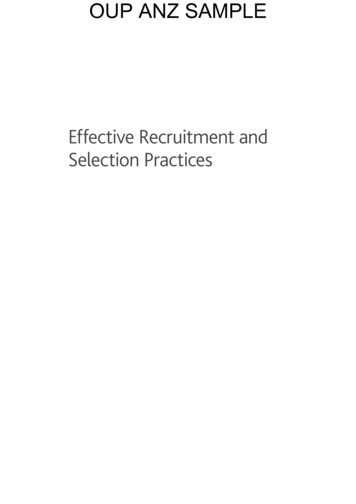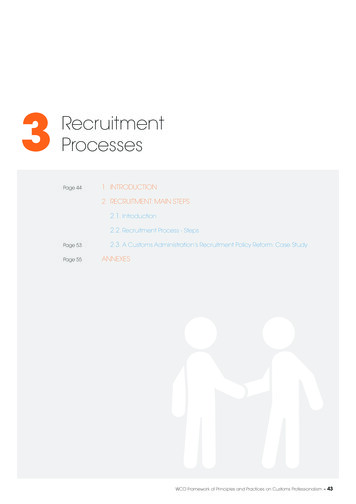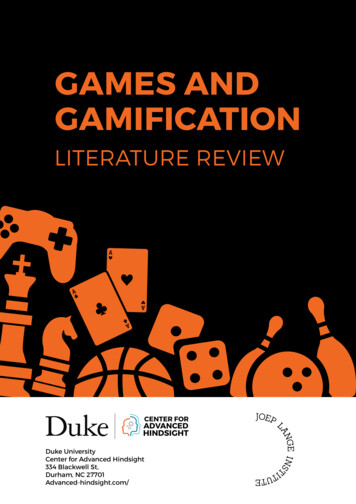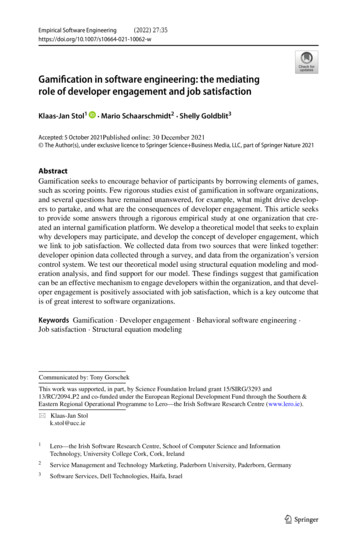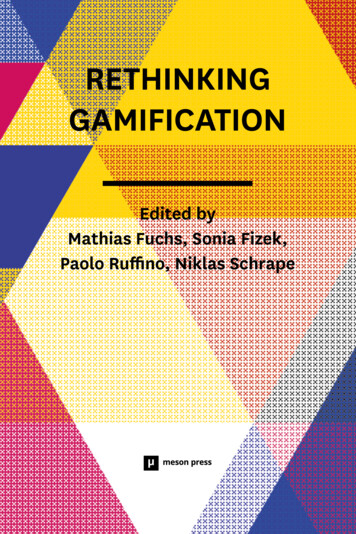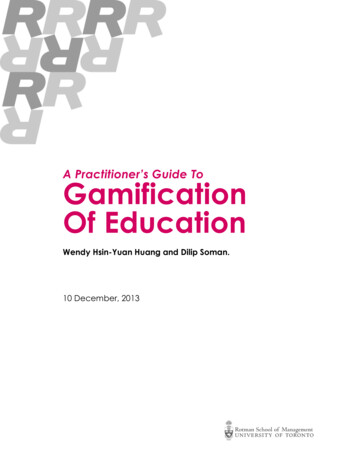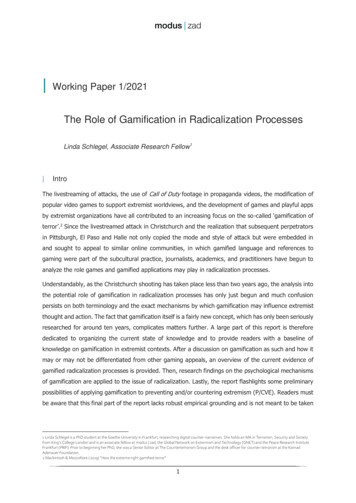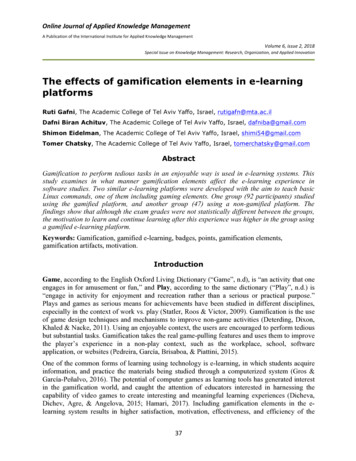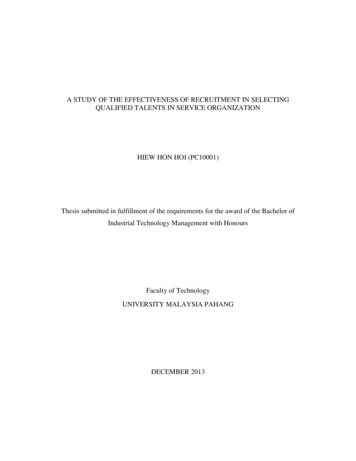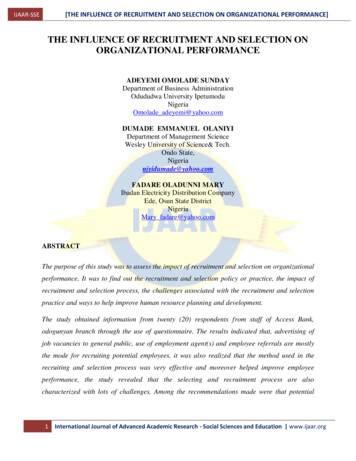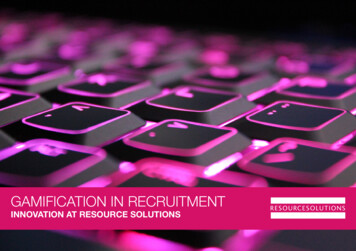
Transcription
GAMIFICATION IN RECRUITMENTINNOVATION AT RESOURCE SOLUTIONS
CONTENTS3INTRODUCTION4IS GAMIFICATION IN RECRUITMENT IMPORTANT?6CASE STUDIES9INNOVATIVE PROVIDERS11WHAT TO CONSIDER BEFORE APPLYINGGAMIFICATION TO YOUR RECRUITMENT STRATEGY12SOURCES13CONNECT WITH US
n/nounThe application of typical elements of game playing (e.g. point scoring, competitionwith others, rules of play) to other areas of activity, typically as an online marketingtechnique to encourage engagement with a product or service.Despite increased media coverage over recent years, the gamification of therecruitment process is not new. In fact, one of the earliest attempts to gamifyrecruitment was by the US Army in 1999 with America’s Army, an online game whichallows players to virtually explore the Army at their own pace and help to determine ifsoldiering matches their needs, interests and abilities. America’s Army is still used asa recruitment platform today. However, as organisations compete for top-tier talent,gamification has returned to the top of the talent acquisition agenda globally.The uses of gamification have undoubtedly expanded significantly since 1999,with games being used to determine job candidates’ risk tolerance and other traitsthat could determine how well they’ll perform in certain types of jobs, as well asassessing skills and abilities for particular roles.One of the main challenges for HR professionals is to contextualise their needs –which part of the existing recruitment or selection process would genuinely benefitfrom gamification? At what levels could gamification be appropriate and add value?Cultural and geographic differences must also be considered, leading many globalbusinesses to gamify processes on a market by market basis. Localised, bespokegames can enhance engagement and user experience, but add significant time andcost to the development process.With smartphone usage surging globally, Resource Solutions anticipates that wewill start to see significant investment from major employers aiming to engage withpriority talent, particularly at the early-career level, using gamification.3
IS GAMIFICATIONIN RECRUITMENTIMPORTANT?PROS AND CONSPROS According to game designer, J McGonigal, the average westernmillennial will have spent 10,000 hours on computer generatedgaming by the time they are 21. Millennial and generation Z talent expect to interact with technologyconstantly. According to a 2011 study conducted by Cisco System,Millennials view the internet as important as air, water, food,and shelter. Personality questionnaires can rely on the ability and willingnessof candidates to accurately describe themselves. Researchhas shown such self-report questionnaires are potentially opento considerable distortion, especially when a job is on the line.Gamification can reduce this risk. Bob Nowill, Director of Cyber Security Challenge UK, believesthat gaming is the way to get talent interested in the sector. “Thenext generation of cyber security talent is likely to come from thegaming environment,” says Nowill, “so we have to reach them intheir own environment.” Gamification can be online or in a face to face setting, providingrecruiters with a blended approach to communicating with talent.Whilst many games are online, Google’s Code Jam eventattracts 7500 participants, with the finals being held at their NewYork office. Games appear to resonate with their target audience. Brian Burke,Research Vice President at Gartner estimates that employeefocused gamification applications now exceed customer focusedgamification applications.4
CONS Administering a test or a game remotely has the potential to screenout entire classes of workers. Whilst online games are popularwith multiple demographic groups, there is a clear link betweensocial deprivation and internet use. Those who never use theinternet are likely to live in a more deprived geography, potentially limitingthe of talent engaged via gamification recruitment initiatives. Measuring the ROI from gamification can be difficult, at best, andat times impossible. This is of particular significance as the costof recruitment focused games can spiral. There are critical ongoingcosts that are not always obvious, including compliance/legal costs,community management and policing and continuous creative (suchas avatars and challenges. Technology is evolving so quickly that games targeting specific and/ormultiple cohorts will appear outdated soon after launch, resulting infurther costs and ongoing investment. Games do not typically offer a tailored, bespoke experiencefor different users, potentially resulting in less engagement unlesscomplemented by events or face to face communication opportunities.The success of early careers networking events hosted by companiessuch as Bright Network suggests that top tier applicants also expect apersonalised approach.5
CASE STUDIESHackertrailhackertrail.comResource Solutions recently ran a campaign through Hackertrail,a website which is set up to invite IT candidates to completechallenges – for example, hacking a website – the results of whichare then shared with potential employers. We trialled this for atelecommunications client in Asia. The target audience for eachcampaign was a specific set of technologists residing in Malaysia,with a particular focus on those that reside in Kuala Lumpur. Theonline coding challenge was shared through a number of socialmedia sites for three specific skillsets: Java Software Engineer PL/SQL Developer and IP Support Engineer.The Results685 candidates visited the challenge site, with 42 registering tocomplete the challenge.6
L’OrealPwCyoutu.be/tzKIfbw d0Qmultipoly.huBetween 2010 and 2015, L’Oreal in India used gamification tools to recruit formarketing, human resources, sales and operations roles. Their game, Reveal,allowed players to experience working in a global firm, interact with avatarsrepresenting employees and get a sense of which department they might besuited for at L’Oreal. “Gamification tools deployed by us call for solutions to real-lifechallenges. It helps us screen the applicant’s analytical skills, which may not bepossible via traditional hiring means. We attempt to recruit 20% of the company’smanagerial cadre though gaming channels,” says Mohit James, HR Director atL’Oreal India.PwC in Hungary set a goal: to more fully engage its pool of candidates duringthe search process. Traditionally, candidates were spending less than 15 minuteson their career website, and the firm was interested in attracting more suitable,qualified candidates. This resulted in the development and launch of a gamecalled Multipoly, which allows PwC candidates to virtually test their readiness andsuitability for working at the firm by working in teams to solve real world businessscenarios. Multipoly presents users with tasks based on the PwC competencies,such as building business acumen, such as building business acumen, increasingdigital skills and embracing relational skills.The ResultsFollowing the achievement of the key project deadlines, the Reveal game, includingall assessment components, was successfully launched across the globe inJanuary 2010. The game secured a number of industry awards including the 2010National Graduate Recruitment Award for the ‘Most Innovative Way of AttractingGraduates’. By 2015 the game had amassed 120,000 players.The ResultsNoemi Biro, PwC Hungary’s Regional Recruitment Manager, noticed candidateswho had played the Multipoly game were better prepared for the “live” face-to-faceinterviews, as the game “pre-educated [them] about PwC and its vision, servicesand skills needed for success.” Biro says new hires with Multipoly experience alsofind on-boarding at PwC easier, as they have already experienced company culturethrough the game. Overall, Multipoly increased the number of applicants by 190%and 78% of those completing the game were interested in joining PwC.7
GCHQcanyoucrackit.co.ukThe Government Communications Headquarters (GCHQ), famed for breaking theGerman Enigma codes at Bletchley Park during the Second World War is nowresponsible for protecting the UK against cyber crime and terrorism. A major talentrequirement of GCHQ is hiring people “who can think both like a hacker and adefender”. They created an encrypted image on a website called CanYouCrackIt.co.uk . Candidates who successfully deciphered the hidden message were directedto a page revealing both the source of the code and the career opportunities.The ResultsDesigned by creative agency TMP in 2011, the campaign was a massive success,with 95 million visitors to the site. GCHQ’s Head of Resourcing, Jane Jones,said that the game had, “revealed a lot of undiscovered talent that we’re keento explore”. Approximately 5,000 people applied for the role from which 170applications were brought forward. The success of the game resulted in a followup challenge called, ‘Can you find it?’ where prospective candidates solve 5 codeshidden around the web.8
INNOVATIVE PROVIDERSKnackknack.itKnack uses video games as a screening platform ratherthan device to determine how creative, cautious, adept atmultitasking or easily distracted, among other attributes, jobapplicants are. Its Wasabi Waiter game, for example, caststhe player as a server at a sushi restaurant who must figureout which dishes to recommend.Wasabi Waiter is visually similar to hundreds of otherrecreational online games. Players acting as sushi serverstrack the moods of their customers, deliver them dishesthat correspond to those emotions and clear plates,while tending to incoming patrons. Unlike most games,though, Wasabi Waiter analyses every millisecond ofplayer behaviour, measuring conscientiousness, emotionrecognition and other attributes that academic studies showcorrelate with job performance. The game then scores eachplayer’s likelihood of becoming an outstanding employee.9
THE IN-HOUSE INNOVATION TEAM AT RESOURCE SOLUTIONSCONDUCTS MARKET ANALYSIS TO IDENTIFY LEADING,RESPECTED GAMIFICATION PROVIDERS GLOBALLY*.Arctic Shoresarcticshores.comArctic Shores creates game-based psychometrics, which theyclaim are an objective and engaging approach to personality andcognitive assessment. They combine validated psychometricmethodology with machine-learning and mobile game design toprovide deeper candidate insights for better hiring decisions.How Arctic Shores’ game-based assessments work:Capture: Candidates intuitively react to in-game challenges,recording a digital fingerprint of over 3,000 data points.Combine: Big data analytics combine thousands of in-game actionsto form meaningful psychological variables.Compare: Candidate traits are compared to a large norm group oremployer specific benchmark.Deloitte plans to use Arctic Shores’ Firefly Freedom to recruit 200apprentices. If this works, they may use it as part of a recruitmentprogramme that brings 1,500 people a year into the business. Theaim is to find “high-potential recruits who may not necessarily standout through a traditional recruitment process”.Codilitycodility.comCodility is a Poland-based coding assessment tool whose bespoketests can be produced by selecting from a constantly evolving poolof 100 tasks of different types (coding, algo, buig fixing, SQL), atthree difficulty levels.Test results are scanned and compared to previous submissions.Identical copies are flagged, making cheating far more difficult thanmost tests. Ease of implementation and low cost means lots ofapplicants can participate, thus reducing the risk of losing out ontalented coders.Codility is relatively simple to implement and is highly respectedin the coding community. Resource Solutions has been triallingCodility with a number of financial services clients in the UK. Initialtrials suggest that it has the potential not only to improve candidateexperience, but also to generate significant cost savings if used toreplace first stage technical telephone interviews.Emma Codd, Managing Partner for Talent at Deloitte, said: “Weneed people to join Deloitte from a variety of backgrounds,bringing a range of perspectives and experience. There iscompelling evidence that alternative recruitment methods supportthis objective, helping to identify exceptional talent by providingopportunities for the millennial generation to shine.”*Resource Solutions does not endorse any individual provider or product10
WHAT TO CONSIDER BEFOREAPPLYING GAMIFICATION TO YOURRECRUITMENT STRATEGY Are there currently any pain points in your recruitment process? What specific benefits could gamification offer? Are there examples of successful gamification in your sector or context? Which platforms do your target audience currently use? Is gamification mandatory or optional for applicants? Could gamification potentially reduce the number of applications? For which vacancies could gamification be considered appropriate? Could gamification aid or detract from your diversity initiatives? Will gamification be online only or a physical challenge suchas a hackathon? Does your preferred provider have accreditation, and is theirproduct based on independent research? What is the geographic footprint of your preferred provider? Do theyunderstand your local market nuances? How will gamification be measured and assessed? Can ROI beaccurately calculated? Has your recruitment team been involved in the development process? Do you have the time to set aside to develop and deploy a game thatsuits your recruitment needs?11
Anderson, G; Dr Covadonga Gijón, Professor Jason Whalley t access in glasgow 2015final - aug 15.pdfArctic Shores Bloomberg hemistry group ion-of-recruitment-work/Forbes -for-human-resources/iMedia Connection h-gamification/Mashable ng/#s13hyY14mgqRNational Public Radio es-and-big-dataNew York Times b-application-couldinvolve-a-video-game.html? r 1Times of 4086557.cmsZichermann cism-overjustificationownership-addiction.html12
CONNECT WITH rcingResourceSolutionsRPOResource Solutions’ dedicated Innovation teamprovides market intelligence, research, insights and trendreporting to all clients globally. For further information,please contact a member of the Innovation team directly:Resource Solutions is a provider of Recruitment ProcessOutsourcing (RPO) and Managed Service Provider (MSP)solutions. We have delivered these solutions to leadingorganisations since 1997 and manage a recruitmentbudget of over 2 billion on behalf of our clients. Aspart of the Robert Walters Group, our business hasconsiderable resources at its disposal. With a truly globalfootprint across 24 countries, we are able to work in closepartnership with organisations and manage everythingfrom global accounts with demanding resourcingstrategies to single sites with lower recruitment volumes.Faye Walshe, Director of Innovationfaye.walshe@resourcesolutions.comTom Lakin, Innovation Consultanttom.lakin@resourcesolutions.comFor enquiries about recruitment outsourcing solutionsfor your business contact:Joanna Fagbadegun, Sales Directorjoanna.fagbadegun@resourcesolutions.com13
gamification has returned to the top of the talent acquisition agenda globally. The uses of gamification have undoubtedly expanded significantly since 1999, with games being used to determine job candidates’ risk tolerance and other traits that could determine how
